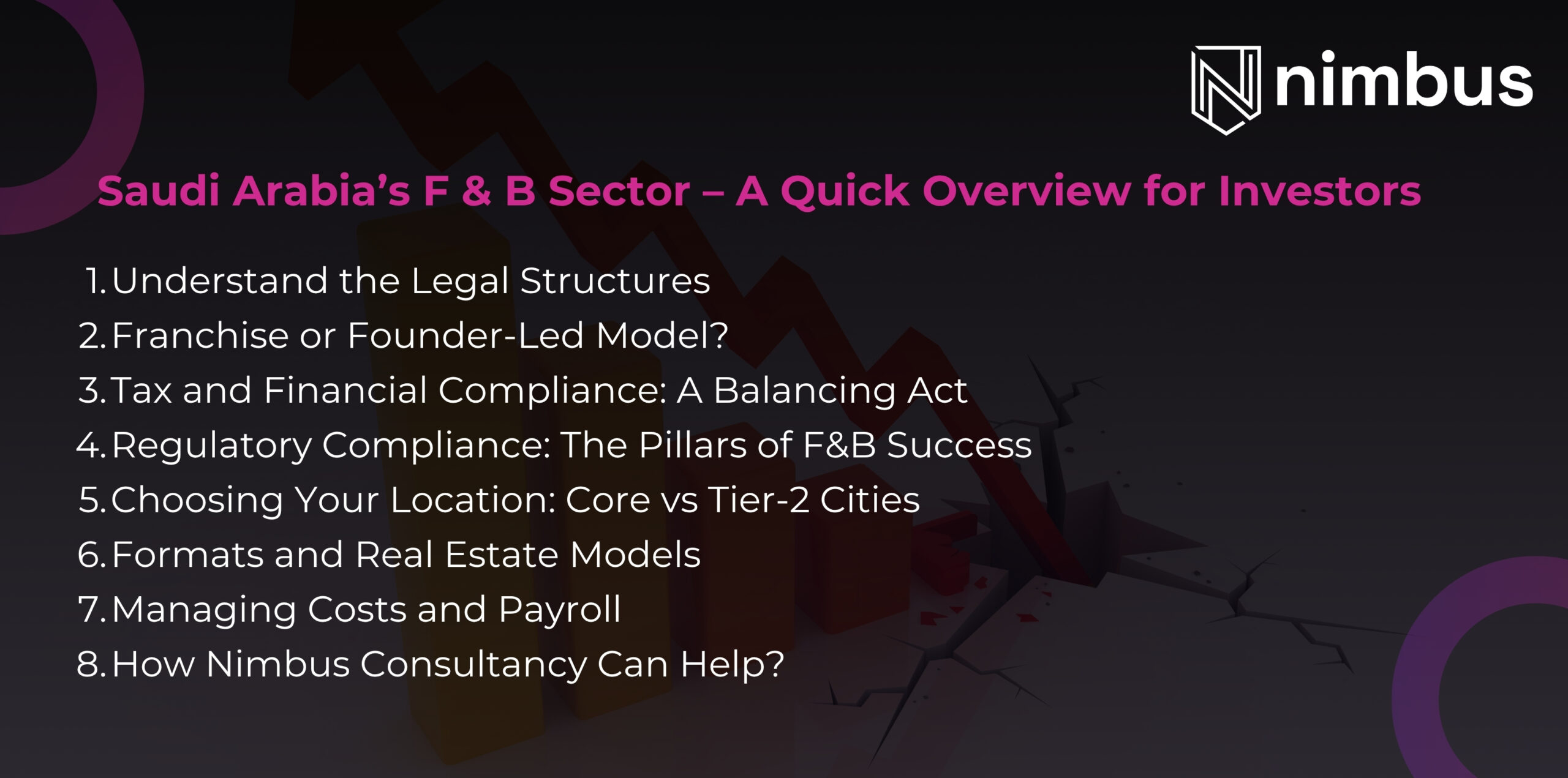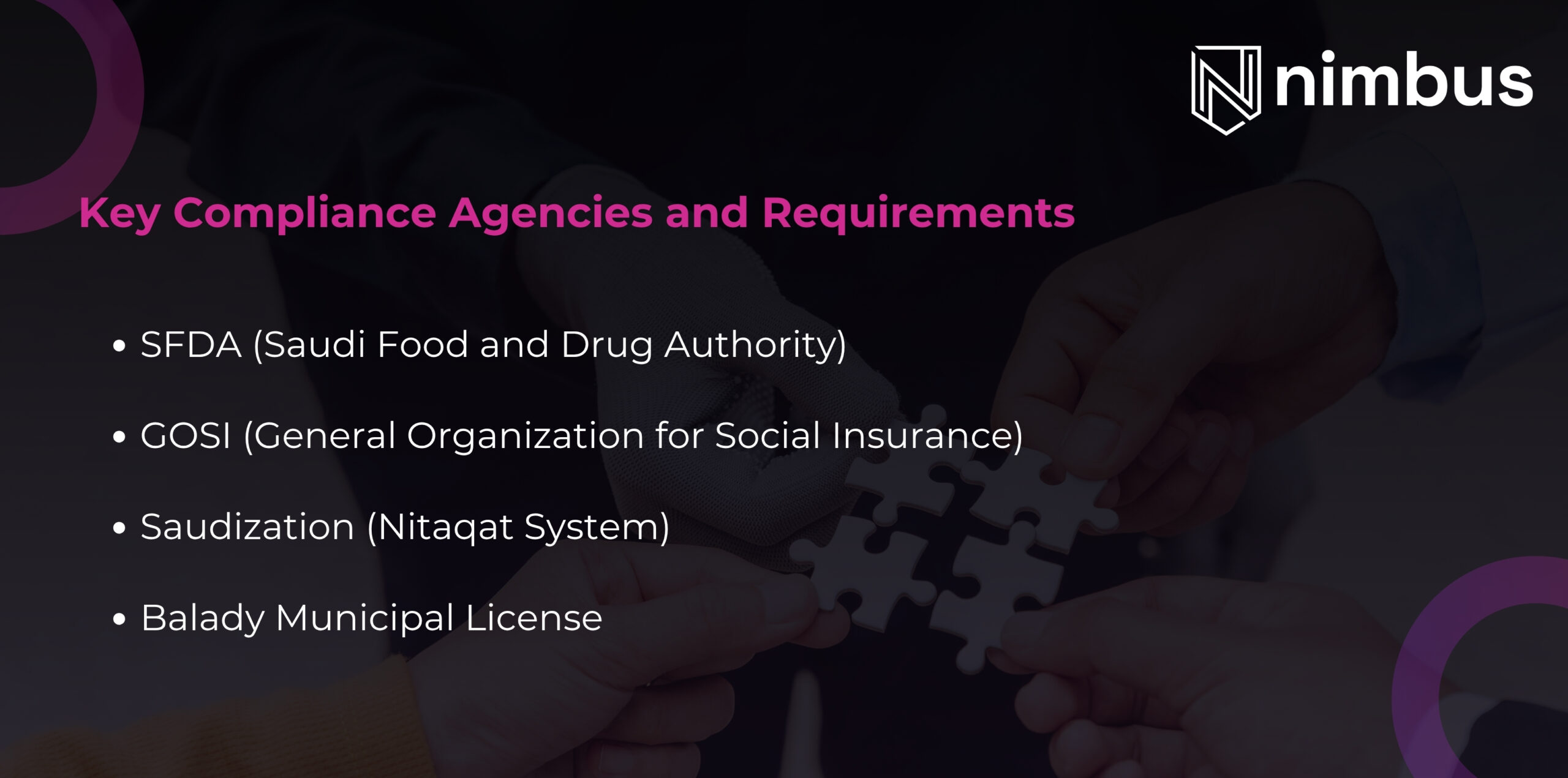Saudi Arabia’s food and beverage (F&B) market is transforming at a rapid rate. Driven by Vision 2030 and a rising consumer appetite for global and premium dining experiences, the industry is projected to nearly double in value, from USD 31.69 billion in 2024 to USD 61.77 billion by 2032.
This expansion is not only fueled by tourism and urbanization but also by a surge in QSRs (Quick Service Restaurants), casual dining chains, and food halls. But with opportunity comes complexity.
Foreign investors and restaurant brands eyeing the Saudi market must navigate regulations, tax structures, Saudization requirements, and licensing procedures. This post gives you insights on how to enter and thrive in this high-growth yet highly regulated space with a compliant business setup in Saudi Arabia.
Saudi Arabia’s F & B Sector – A Quick Overview for Investors

1. Understand the Legal Structures
Getting your structure right is not just a legal formality. It can define how scalable and sustainable your business is in Saudi Arabia.
Option 1: 100% Foreign Ownership
- Offers full control and profit retention.
- Requires licensing through the Ministry of Investment Saudi Arabia (MISA).
- Demands higher upfront compliance and capital requirements.
Option 2: Joint Venture with a GCC National
- A Saudi partner holds at least 25%.
- Eases some bureaucratic processes and gives local market access.
- Shared ownership limits control and may lead to disputes.
2. Franchise or Founder-Led Model?
One of the biggest strategic decisions is whether to franchise or run your own chain.
Master Franchise Model
- Ideal for quick market entry with lower capital.
- Franchisors scale via Franchise Disclosure Documents (FDDs).
- Lower control, limited menu agility, and royalty payments (typically 5–10%).
Owned Chain Model
- Offers brand control, operational flexibility, and profit retention.
- Demands higher investment and assumes more financial risk.
- Best for premium brands, evolving menus, or brands focused on storytelling.
Many international players such as PF Chang’s and Five Guys have entered through franchise models, but niche and luxury concepts often benefit from owning and operating their outlets directly.
3. Tax and Financial Compliance: A Balancing Act
Saudi Arabia’s dual tax structure requires understanding the differences between Zakat and corporate income tax.
Zakat vs Corporate Tax
- Saudi or GCC majority-owned companies pay Zakat at 2.5% on net assets.
- Foreign-owned entities are subject to corporate income tax.
Additional Considerations
- VAT grouping under a holding company simplifies tax filing across branches.
- Profit repatriation may incur a 15% withholding tax.
- Holding companies are commonly used to manage tax exposure and ensure long-term scalability.
Many investors prefer holding structures for company formation in the KSA as they offer centralized oversight, ease of compliance, and facilitate regional growth.
4. Regulatory Compliance: The Pillars of F&B Success
Saudi Arabia has very specific standards when it comes to food safety, employee registration, and labor quotas. Non-compliance can lead to fines, operational disruptions, or even business suspension.
Key Compliance Agencies and Requirements

- SFDA (Saudi Food and Drug Authority): Oversees hygiene, labeling, and storage. Fines can reach SAR 50,000 for violations.
- GOSI (General Organization for Social Insurance): All employees must be registered, or the business risks license suspension.
- Saudization (Nitaqat System): Requires that 40% of restaurant employees and 50% of café staff be Saudi nationals.
- Balady Municipal License: Each location must be approved via the Balady platform. Skipping this step can lead to costly retrofits.
Pro Tip: Always get location approval from Balady before signing a lease to avoid expensive modifications.
5. Choosing Your Location: Core vs Tier-2 Cities
Saudi Arabia’s urban centers offer different pros and cons depending on your brand, format, and risk appetite.
Top Tier Cities
- Riyadh: Mature market, high competition, strong consumer demand.
- Jeddah: Dynamic, family-oriented market, heavy mall traffic.
- Khobar: Popular among affluent Eastern Province consumers.
Emerging Tier-2 Cities
- Abha, Hail, Tabuk: Lower competition, fewer skilled workers, emerging customer base. Ideal for cost-effective expansion and first-mover advantage.
6. Formats and Real Estate Models
F&B concepts must align with the right outlet format. This affects not just visibility but also your cost structure and operational agility.
Outlet Types
- Mall-Based: Steady footfall, family crowd, premium leases (SAR 2,000–5,000/sqm).
- High-Street: Great for visibility, often subject to zoning rules.
- Drive-Thrus: Gaining popularity in Riyadh; offer convenience and require lower CAPEX.
- Cloud Kitchens: Growing fast in Tier-2 cities via platforms like Jahez.
Lease Structures
- Fixed Lease: Offers stability but higher upfront costs.
- Revenue Share Model: Aligns landlord incentives with operator success. Common in malls and emerging districts.
7. Managing Costs and Payroll
F&B businesses face inflation in raw materials and increasing payroll due to Saudization.
Cost Pressures
- Food prices are rising at 2.4% annually.
- Hiring local talent increases payroll expenses by up to 30%.
You’ll need a strong procurement and HR strategy to manage profitability.
8. How Nimbus Consultancy Can Help?
Entering Saudi Arabia’s F&B market is rewarding but complex. Our role is to simplify and accelerate your journey. From managing MISA approvals to optimizing your tax structure or ensuring you’re fully compliant with SFDA and Saudization quotas, we provide full-spectrum support.
Saudi Arabia is one of the most exciting F&B frontiers in the world right now. But building a successful brand here isn’t just about the food; it’s about navigating a sophisticated regulatory and business ecosystem.
With smart structuring, localized expansion, and professional compliance guidance, you can build a lasting F&B brand with seamless business incorporation in the KSA.



